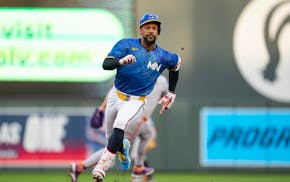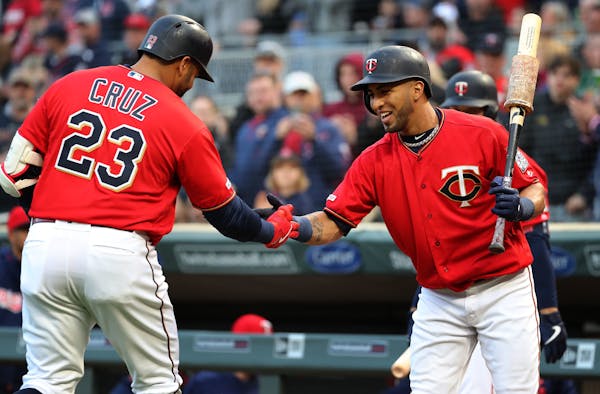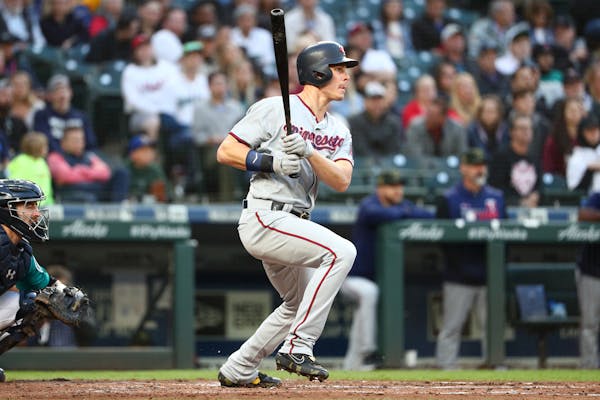Five years into his big-league career, on pace toward one of the best slugging seasons in Twins history, Eddie Rosario says he has discovered the secret to hitting home runs:
Try to hit singles.
"[People] say, 'Oh, you try to hit home runs.' No," said Rosario, who this year became the eighth (and Max Kepler the ninth) Twin ever to enter the All-Star break with 20 or more home runs. "You don't hit [them] that way. You try to hit the ball hard, and it goes where it goes. Maybe single, maybe it's caught. And sometimes, it's [a] home run."
More than ever, it is. The stratospheric surge of home runs this season was a frequent topic at this week's All-Star festivities, with MLB headed toward more than 6,600 home runs this season — nine percent more than have ever been hit in a single season. Commissioner Rob Manfred said the sport's executives don't know what is responsible for the power surge, but some researchers believe the baseball has been altered.
Four teams are currently tracking toward exceeding baseball's single-season record of 267, set only last year by the Yankees, and the Twins, incredibly still on a 300-homer pace at midseason, lead the pack. The breadth of the phenomenon is amazing, and the numbers can be dizzying: The Twins have more four-homer games than any other MLB team — and more five-, six-, seven- and eight-homer games, too. A Twin has hit more than one homer in a game 18 times, also most in the majors. Ten Twins have already hit 10 or more homers (and Byron Buxton has nine); no other team has more than eight such players.
It's a remarkable turnaround for a franchise rarely known recently for power hitting. Since 2000, only the Royals have hit fewer home runs than Minnesota in the American League.
That changed this year, and something even more important did as well. The Twins entered the All-Star break in first place for the first time in 17 years this week, and only the eighth time ever.
Which explains why the manufacturing specifications of the ball or its aerodynamic properties haven't been a controversy in the Twin Cities. "Yeah, with our lineup, nobody is complaining about home runs in Minnesota," Twins pitcher Jake Odorizzi said.
Especially the hitting coach — who is willing to admit he's a little amazed by it all, too.
"To say you thought this was going to happen, on this scale, I don't think you predict this. You can't predict these kind of numbers and the amount of balls we're driving this year," James Rowson said. "But taking a big step forward, we knew it was a possibility. There was always the feeling that if everybody clicks, this team can do something special. We can hit it out of the park with anybody, and if you really look at our lineup, I don't think that surprises anybody."
That lineup, and the changes the Twins made to it over the winter, is responsible for much of the ferocity with which the Twins hit the ball these days. Adding C.J. Cron, Jonathan Schoop and Nelson Cruz, each of whom had turned in a 30-homer season in the past two years, added a jolt of electricity to what had been a battery-powered attack.
But the real drivers of the Twins' long-ball attack are the home-grown sluggers.
"That's one of the coolest things about it. We're seeing guys who we've always known had good power take it to another level," Rowson said. "You can project a kid's development all you want, but it's up to him to accomplish it. And we're seeing that."
They're seeing it from Rosario, already within range of his career high of 27. And from Mitch Garver, whose 13 homers are nearly twice as many as the seven he hit last year. And from Jorge Polanco, who has tied his 2017 output of 13 by midseason. And from Max Kepler, who blew past his career high of 20 on June 29.
It's likely all six hitters who came up through the Twins' system — those four, plus Buxton and Miguel Sano — will set new standards for themselves this season.
"We call them kids, but they're not. They're legitimate, established major league hitters who just are at the beginning of realizing some of their potential," Twins manager Rocco Baldelli said. "It's exciting, because these are guys who are just entering their prime, and they're growing together."
Are all these home runs somehow cheapened by their context? Do they mean less, given they're part of a leaguewide flood of homers?
Rowson doesn't think so.
"The power is real. Maybe you could argue that the numbers wouldn't be quite so high, but we're not just hitting home runs," Rowson said, and it's true: The Twins lead the AL in doubles (188), too, and are second overall in hits (861). They have scored the most runs in baseball (509), too, and their MLB-best .497 slugging percentage is fully 13.7 percent better than any other Twins team in history. "We don't have anybody playing the game selfishly. We're not trying to hit home runs. This is a group of guys that doesn't care if they hit 10 home runs or 40."
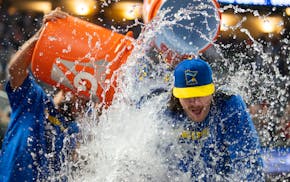
Paddack clings to perfection into the sixth inning, pitching the Twins past the Giants
Reusse: Twins play Giants, triggering Mays memories and a question: Can we get the Black players back?
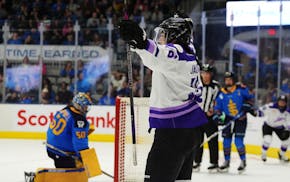
Frost turn away Toronto, even PWHL playoff series at a win apiece
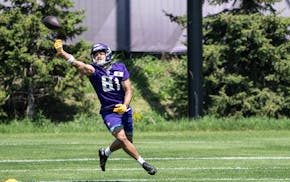
Montigo Moss, working to make the Vikings roster, provides an update on famous father Randy
